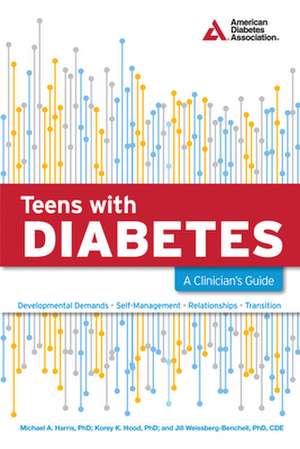Teens with Diabetes: A Clinician's Guide
Autor Michael A. Harris, Korey K. Hood, Jill Weissberg-Benchellen Limba Engleză Paperback – 4 aug 2014
Written by three psychologists with more than 50 years of collective experience in the field of diabetes and youth, Teens with Diabetes provides evidence-based techniques for clinicians to treat the psychological needs of children with diabetes and help them transition into their teenage years. The authors have provided care to thousands of diabetic teens and their families from initial diagnosis to leaving home for college. Any professional working with diabetic teens, including psychologists, physicians, social workers, dietitians, and nurse educators, needs this how-to handbook for working with what is arguably one of the most difficult populations in diabetes. Topics covered include handling the initial diagnosis of diabetes in teens, talking with young people about diabetes in a manner that is effective and reduces reactivity, improving diabetes self-care, helping families negotiate the challenges of adolescent diabetes, dealing with peer relations, dealing with high-risk issues related to diabetes, and handling with mood problems.
Preț: 276.43 lei
Puncte Express: 415
Preț estimativ în valută:
48.89€ • 57.96$ • 42.56£
48.89€ • 57.96$ • 42.56£
Carte tipărită la comandă
Livrare economică 30 martie-13 aprilie
Specificații
ISBN-13: 9781580405317
ISBN-10: 1580405312
Pagini: 115
Dimensiuni: 152 x 226 x 10 mm
Greutate: 0.18 kg
Editura: American Diabetes Association
ISBN-10: 1580405312
Pagini: 115
Dimensiuni: 152 x 226 x 10 mm
Greutate: 0.18 kg
Editura: American Diabetes Association
Cuprins
- Introduction
- Acknowledgements
- Developmental Demand of Adolescence: This chapter provides a context about why teenagers behave the way they do and how different approaches may be necessary when interacting with teenagers. This chapter helps when that next adolescent patient shows up in your clinic and displays a defiance of convention, social priorities versus personal priorities, and a sense of invulnerability and invincibility. Further, there is a discussion of how these adolescent qualities contribute to diabetes management.
- Diabetes Self Management: This chapter focuses on the many challenges that teens have in managing their diabetes while trying to be a "normal" teenager. The fact that there is not necessarily a 1:1 relationship between diabetes care and metabolic control is introduced and developed.
- Language of Diabetes: Teens are very sensitive to the words that clinicians use and in many cases we use strong language that may not reflect the reality of the situation. Various interviewing and communication techniques are described and discussed.
- Parent-Teen Relationships and Diabetes: Despite the fact that teens push parents away during adolescence, parents still represent a powerful model for teens as well as important sources of support. Ideas will be offered to professionals working with teens to better understand their parents and how they may involve them in their diabetes care. Focus on some skills (problem solving, communication skills) that teens can develop and sharpen in dealing more effectively with their parents around both general issues as well as diabetes-related issues. "Miscarried helping" that often occurs in families of teens with diabetes and ultimately results in conflict around diabetes management is discussed.
- Mood: This chapter describes the increased risk for depression and anxiety in adolescents with type 1 diabetes as well as the potential reasons for this risk. Given the two- to three-fold risk of depression for youth with type 1 diabetes in comparison to the general adolescent population, this is an important area to highlight for teens. A review of the warning signs of depression and anxiety are reviewed and strategies offered for coping with them. In addition, we highlight how certain diabetes-specific factors and family variables can contribute to feeling depressed. Professionals are given strategies for discriminating between diabetes burnout, depression related to diabetes, and depression that exists independent of diabetes. Treatment options are described across individual, family, and medical approaches based on extant research.
- Technology and Diabetes: New technology is discussed to help teens better manage their diabetes and make having diabetes easier. We take a look at the latest and most effective technology, discussing its pros and cons. The insulin pump which is popular among teens with diabetes, especially very active teens, is introduced and discussed. Other technology such as the Glucowatch and the use of continuous glucose monitoring is discussed. And finally, cutting edge research and technology such as inhaled insulin, islet cell transplants, and other treatments is presented and discussed.
- Repeat Diabetic Ketoacidosis: It is a well-known fact that adolescence is the most difficult time to control blood sugars, and despite the fact that most teens with diabetes "weather" this period in their lives without excessive hospitalizations for DKA, there is a subgroup of teens who evidence a major deterioration in their metabolic control and are repeatedly hospitalized for DKA. Typically these teens maintain double-digit HbA1c's and are often referred to as "frequent fliers" or "train wrecks" by members of their diabetes treatment team. Teens with such problems are often difficult to treat, resulting in increased time and stress for health care providers with these challenges increasing exponentially. Furthermore, due to the chronic and difficult-to-treat nature of diabetes, substantial costs are associated with the management of young people with diabetes.
- High Risk: Much is known about "high risk issues" in healthy teens, however, many professionals forget that teens are teens, regardless of health status. We provide direction to professionals about the incidents of high risk behaviors among teens including smoking, drugs, alcohol use, and sexual behavior and the importance of addressing these behaviors sooner rather than later in teens with diabetes given the greater impact of these behaviors on teens with diabetes.
- Transitioning and the Emerging Adult: Most professionals do not think about the issue of transition of their patients from pediatric or family care provider to an adult care professional; however, we know that this transition period is a time when many teens are lost to follow up, mostly because the health care system is not designed to effectively deal with teens during this transition. Ideas are provided for helping patient in managing their own transition rather than assuming that their health care providers will manage this transition. The unique developmental stage of "emerging adulthood" and the developmental demands of this stage and how these demands make managing diabetes very complicated and possibly very difficult are presented. Other major life changes, like going to college is discussed with tips on what to expect from the college, what to expect from roommates, and who to see for diabetes care while at college. We emphasize how managing diabetes in college can increase the chances for a great experience in college across social, academic, and interpersonal areas.
- Advocacy for Teens with Diabetes: This chapter focuses on helping teens to advocate for themselves at clinic visits, school, athletics and other environments outside of their homes when they have to care for their diabetes. The multitude of resources that are available for teens with diabetes are presented. The chapter includes some examples of how others with diabetes have championed the many obstacles and challenges that exist when pursuing goals.
- Bibliography
- Index
Notă biografică
Dr. Michael A. Harris is the chief psychologist at the Harold Schnitzer Diabetes Health Center at the Oregon Health and Science University in Portland, OR, where he also lives. Dr. Korey Hood is an associate clinical professor of pediatrics at the University of California San Francisco School of Medicine. A licensed clinical and health psychologist who has worked in specialty diabetes clinics providing behavioral health services, he lives in San Francisco. Dr. Jill Weissberg-Benchell is an associate professor in psychiatry and behavioral sciences at the Ann and Robert H. Lurie Children's Hospital of Chicago. She lives in Chicago.














